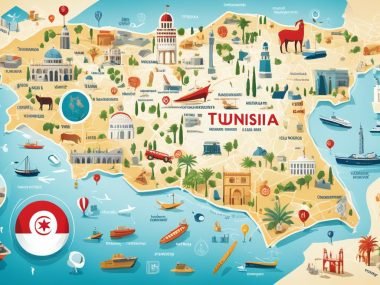Embracing the allure of Tunisia’s vibrant culture and Mediterranean warmth, I’ve taken a keen interest in the experiences of UK expatriates and the process of relocating to Tunisia from the UK. As someone passionate about discovery and global living, I’ve compiled a guide that demystifies the narrative: “Can A UK Citizen Live In Tunisia?“
For those from the UK considering a Tunisian adventure, the news is promising. Tunisia warmly receives UK citizens for short stays, with no visa requirement for visits up to three months. However, my research underscores the importance of having a valid passport during your stay. If the lure of Tunisia’s shores beckons you for longer than three months, getting acquainted with the local immigration laws is a must, particularly the residence permit known as the Carte de Séjour.
Join me as I delve into the nuances that UK expats in Tunisia should anticipate when considering their Mediterranean relocation.
Key Takeaways
- Short stays up to three months in Tunisia do not require a visa for UK citizens.
- A valid British passport is a must-have for identification purposes at all times.
- The residence permit, known as Carte de Séjour, is essential for UK citizens planning to extend their stay beyond three months.
- It’s crucial to ensure passport validity aligns with the duration of your visit.
- Understanding the local immigration laws is vital as part of the relocating to Tunisia from the UK process.
Understanding the Basics: Entry and Residence Requirements for UK Expats in Tunisia
As I explore the possibility to transition my life from the UK to the sunny climes of Tunisia, I’ve become intimately acquainted with the entry and residence requirements for UK citizens living in Tunisia. I have scoured through the Tunisian Ministry of Interior’s resources, confirming that while short stays do not necessitate a visa for UK citizens in Tunisia, planning a prolonged stay is another matter entirely.
My findings specifically highlight the need for a residence permit for UK citizens in Tunisia, colloquially known as Carte de Séjour, for anyone considering staying beyond the breezy three-month mark. The legalities clearly stipulate a visit to the local police station’s Bureau d’Etrangers, within the region of your Tunisian abode, to seek authorization for prolonged residency.
The bureaucracy might seem daunting but rest assured, the process is laid out with a clarity that is reassuring to overseas adventurers like myself. Beyond the realm of visa and residence permits, the practicalities of everyday life such as driving have their own set of stipulations. To legally navigate Tunisia’s roads, a UK expat needs an International Driving Permit (IDP), along with a mental note to switch to a Tunisian driving license after the one-year threshold.
- Confirm personal eligibility for Tunisia’s entry and residence provisions.
- Understand the requisites and application process for the Carte de Séjour.
- Acquire an International Driving Permit (IDP) for initial driving privileges.
- Transition to a Tunisian driving license for stays extending one year.
The journey of planting roots in Tunisia is paved with regulations and requirements; but knowledge is the key. I am making it my mission to walk you through each step so that what once seemed like distant dreams of Mediterranean living are well within our grasp.
Making Tunisia Your Home: Securing Accommodation and Understanding Property Laws
Considering moving to Tunisia as a UK citizen brings into focus the allure of owning a slice of this Mediterranean haven. Venturing into buying property abroad in Tunisia, I ponder the intricacies that shape such a major life decision. Join me as I unravel the layers of property acquisition and outline the essentials for living in Tunisia as a UK citizen.
The Process of Buying Property in Tunisia as a UK Citizen
Embarking on the journey of securing real estate in Tunisia, I’ve learned the importance of consulting official guides which shed light on the legalities. These guides serve as a beacon for navigating through the process of purchasing property, ensuring my steps are aligned with Tunisian law and protecting my interests.
In my quest for a new abode, various elements capture my attention. The types of properties available, their locales, and the overarching real estate laws of Tunisia all play a part in my decision-making process. It strikes me as imperative to ensure that my property transactions are transparent and safeguarded against any conceivable legal hiccups.
Residence Requirements and Living Arrangements for UK Expats
The dream of living in Tunisia as a UK citizen takes more than just finding the perfect home; it encompasses an understanding of the Tunisian residency laws. It’s about laying the groundwork that allows me to call this vibrant country home.
Securing temporary visas is rather straightforward, but for those who, like me, are enchanted enough to stay longer, the Carte de Séjour becomes a necessity. Its acquisition is a pivotal step in legitimizing one’s stay in Tunisia and ensuring that all is above board. This little card is a golden ticket to a world of opportunities within the borders of this North African gem.
As I dive deeper into the specifications of Carte de Séjour and grasp the nuances of the local bureaucracy, I’m heartened by the structured path it provides. It’s a disciplined approach to achieving the kind of lifestyle shift I’m seeking—a true immersion into Tunisian life.

Now, I’d like to share a detailed look at the residence requirements that await any UK citizen desiring to plant roots in this sun-drenched land.
| Requirement | Description |
|---|---|
| Carte de Séjour | Official residence permit required for stays beyond three months, confirming legal residency status in Tunisia. |
| Visa for Temporary Stays | Not required for UK citizens for up to three months, but necessary for longer stays without a Carte de Séjour. |
| Property Ownership | Exploration of the types of properties available, their locations, and adherence to Tunisian property laws. |
| Legal Guidance | Consultation with legal experts to navigate the purchasing process and residence regulations. |
Throughout my explorations, the significance of well-informed preparations and adherence to local laws remains abundantly clear. The key to a blissful life in Tunisia for a UK expat like myself is maintaining due diligence every step of the way. A sturdy foundation built on knowledge and compliance paves the path to a delightful new chapter on Tunisian soil.
Integrating into Tunisia Society: Healthcare, Education, and Employment
As I contemplate living in Tunisia as a UK citizen, I understand that integration into Tunisian society involves navigating the realms of healthcare, education, and employment—each a substantial component of a seamless transition. My focus is particularly on how to adapt and thrive within these societal pillars.
Healthcare in Tunisia presents itself as a mosaic of private and public facilities. While the quality of care is variable, numerous clinics and hospitals are accessible. It’s essential for me to keep in mind that while medical services are available, the British Embassy Tunis is clear in its position of not endorsing specific healthcare providers.
Talking about the Tunisian education system, I’ve found that thorough research is recommended. The Ministry of Education website (though in Arabic) is a resource that provides me with insights into the local educational framework—a crucial aspect for those who are considering moving here with children or looking to partake in educational opportunities themselves.
Meanwhile, employment for UK citizens in Tunisia is governed by rules ensuring certain occupations are reserved for Tunisian nationals. However, jobs within foreign-owned or offshore companies offer unique opportunities. These are intricacies I am keen on understanding, and I strongly advise fellow UK citizens to secure employment contracts that are fully endorsed by relevant local ministries, such as the Ministry of Social Affairs.
To support UK nationals in this complex endeavor, the British Embassy Tunis offers a list of lawyers who can provide legal advice. It’s a relief to know that this guidance can aid in maneuvering through the legalities associated with gaining employment in Tunisia.
| Integration Aspect | Key Considerations for UK Expats |
|---|---|
| Healthcare Access | Available at private and public facilities; embassy recommendations are absent. |
| Education System Navigation | Resourceful Ministry of Education website; personal research mandated. |
| Employment | Regulated job market; endorsement of employment contracts essential. |
| Legal Assistance | British Embassy-provided lawyer listings for employment-related advice. |
I’m heartened by the structured process provided by the Tunisian government and the supporting entities like the British Embassy. My aim is to ensure a thorough understanding of these critical aspects of Tunisian life, paving my way to not just live, but flourish in this Mediterranean country.
- Identify reputable healthcare providers and understand the quality spectrum of medical services.
- Gather specific knowledge about the Tunisian education system for potential educational pursuits.
- Research employment opportunities aligned with legal regulations to ensure compliance.
- Seek professional legal advice when necessary, with resources available from the British Embassy.
Integration is a multifaceted journey. I’m embracing it with an openness to learn and adapt, coupled with a diligent follow-through on all legal and societal expectations.
Navigating Financial Affairs: Banking and Tax Considerations for UK Citizens in Tunisia
Grasping the financial intricacies is paramount for any UK citizen contemplating the benefits of living in Tunisia. The allure of coastal breezes and rich culture is enticing, but as an informed expat, I understand the necessity of comprehensively managing finances for UK expats. I’m delving into the essentials, from the simplicity of opening a bank account in Tunisia to the complexities of the taxation system.
Opening a Bank Account and Managing Finances in Tunisia
With the Tunisian Dinar being a non-convertible currency, setting up a bank account here is not only a convenience, it’s a necessity. I’ve found that local banks are keen to assist foreigners in understanding their offerings. Access to ATMs, the ability to handle credit cards transactions, and changing money are services I’ve come to appreciate. They’re readily available in banks, change bureaus, and larger hotels throughout the region, ensuring I’m never left unprepared.
Below is a table that provides a handy overview of the basic financial services available to UK citizens in Tunisia:
| Financial Service | Availability |
|---|---|
| Bank Account Setup | Offered by local banks with additional consultation for foreigners |
| Currency Exchange | Accessible in banks, change offices, and hospitality establishments |
| Credit Card Transactions | Widely accepted in major retail and tourism-related locations |
| ATM Services | Available across cities, accommodates UK debit and credit cards |
Understanding the Tax Implications of Living in Tunisia
In the spirit of complete preparedness, I tackled the necessary evil that is tax. In Tunisia, all income is taxable, generally hovering around a 20% tax rate. Confirming these details with employers is a step I heartily recommend to all my UK compatriots. Furthermore, I’ve mastered the intricacies of the UK/Tunisia non-double taxation agreement ratified in 1982. It’s the cornerstone for financial planning that assuages the concerns about dual tax obligations, one of the pivotal benefits of living in Tunisia as a UK citizen.
- Income Tax Rate: Up to 20%, verify with employer for precise rates
- Non-Double Taxation Agreement: Fiscal planning aid to prevent dual income taxation
I find there’s no substitute for diligence when navigating the financial waters of a new country. Thanks to thorough planning and an understanding of these key banking and tax considerations, I’m poised to reap the financial benefits and enjoy the rich, cultural tapestry that is life in Tunisia.
Conclusion
As I stand on the brink of embarking on the adventure of relocating to Tunisia from the UK, my journey has been illuminated by a myriad of discoveries. From the enchanting Mediterranean lifestyle to the rich cultural fusion that Tunisia boasts, moving here is a kaleidoscope of both opportunity and practicality. It’s clear that thorough research and diligent preparation of documentation are the cornerstones of a smooth transition into Tunisian life. For UK citizens like myself, we embrace the complexities and rewards with equal fervor, recognizing it as a rewarding gateway to a new chapter and the benefits of living in Tunisia as a UK citizen.
Final Thoughts on Relocating to Tunisia from the UK
Through this in-depth exploration, it’s become evident that while the process may present challenges, the outcomes are bound to be enriching. Understanding the legal and financial implications is critical, and I find myself grateful for the abundant resources that usher me into this seamless integration. Within the fabric of Tunisian society, I see my future-self thriving, imbibing the ethos of a community that stands at a cultural crossroad, offering an exquisite blend of tradition and modernity.
Additional Resources and Support for UK Citizens Planning the Move
The journey does not begin nor end at the departure gate. I have found solace in knowing the British Embassy in Tunis is equipped to guide expatriates through varying aspects of Tunisian living. From healthcare intricacies to navigating the local education system and understanding the financial landscape, the support available makes planning the move to Tunisia a venture met with confidence. Burgeoning expat communities and the rich assortment of resources for UK expats in Tunisia provide a reassuring testament to the warmth with which UK citizens are welcomed. It’s a landscape ripe with prospects, and for those willing to embark on this Mediterranean odyssey, Tunisia awaits with open arms.







